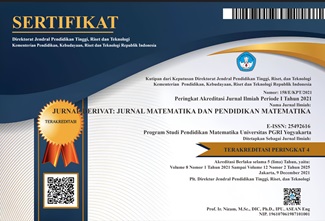Pengembangan LKPD Berorientasi Model Pembelajaran Flipped Classroom Pada Materi Aritmatika Sosial Kelas VII SMP
DOI:
https://doi.org/10.31316/j.derivat.v9i1.3045Abstract
This study aims to produce LKPD oriented to the flipped classroom learning model on social arithmetic material for class VII SMP that is valid, practical and effective. The type of research conducted is Research and Development (RnD). The development model used in this research is the ADDIE development model which consists of the Analysis stage, Design stage, Development stage, Implementation stage, and Evaluation stage. The LKPD was tested on seventh grade students at SMP Negeri 15 Palembang. The research data were obtained from validation questionnaires, student response questionnaires, and learning outcomes tests. The percentage score of the validity level was 89.3% with a very valid category which was assessed by three expert validators, namely two lecturers and one educator. The level of practicality after being tested on students got a score percentage of 83.2% which was in the very practical category. And based on the results of learning tests from students after using the LKPD oriented to the flipped classroom learning model, they were in the good category with an average score of 77, so that the LKPD was effectively used.
Keywords: Social Arithmetic, Flipped Classroom, LKPD
References
Abidin, M. (2019). Model Pembelajaran Flipped Classroom sebagai Upaya Peningkatan Kemampuan Penguasaan Rumus Transformasi Geometri. Journal on Pedagogical Mathematics, 1(2), 49–60.
Ardila, A., Marzal, J., & Siburian, J. (2021). Pengembangan Perangkat Pembelajaran Trigonometri Model Flipped Classroom untuk Meningkatkan Kemampuan Komunikasi Matematis Siswa The Development of Flipped Classroom Model Trigonometry Learning Tools improves Students ’ Mathematical Communication Skills. 11(November).
Bernard, M., Akbar, P., Ansori, A., & Filiestianto, G. (2019). Improve the ability of understanding mathematics and confidence of elementary school students with a contextual approach using VBA learning media for Microsoft Excel. Journal of Physics: Conference Series, 1318(1), 0–7. https://doi.org/10.1088/1742-6596/1318/1/012035
Choirudin, C., Anwar, M. S., & Khabibah, N. (2021). Pengembangan Lembar Kerja Peserta Didik (Lkpd) Berbasis Problem Solving. Fraktal: Jurnal Matematika Dan Pendidikan Matematika, 2(1), 1–13.
Fedistia, R., & Musdi, E. (2020). Efektivitas Perangkat Pembelajaran Berbasis Flipped Classroom untuk Meningkatkan Kemampuan Penalaran Matematis Peserta Didik. Jurnal Didaktik Matematika, 7(1), 45–59. https://doi.org/10.24815/jdm.v7i1.14371
Hayati, R. (2018). Flipped classroom dalam pembelajaran matematika : sebuah kajian teoritis. Prosiding Seminar Nasional Matematika Dan Pendidikan Matematika, 496. http://eproceedings.umpwr.ac.id/index.php/sendika/article/view/329/306
Hidayat, A., & Irawan, I. (2017). Pengembangan Lks Berbasis Rme Dengan Pendekatan Problem Solving Untuk Memfasilitasi Kemampuan Pemecahan Masalah Matematis Siswa. Jurnal Cendekia : Jurnal Pendidikan Matematika, 1(2), 51–63. https://doi.org/10.31004/cendekia.v1i2.20
Marlina, S. M., & Setiawan, W. (2021). Analisis Kesulitan Siswa dalam Mengerjakan Soal pada Materi Aritmatika Sosial Kelas VII. Jurnal Cendekia : Jurnal Pendidikan Matematika, 5(3), 2373–2384. https://doi.org/10.31004/cendekia.v5i3.650
Ningsih, D., Rusdi, M., & Hariyadi, B. (2018). Pengembangan Lembar Kerja Peserta Dididk Berbasis Problem Based Learning-Flipped Classroom Untuk Meningkatkan Transformasi Pengetahuan. Edu-Sains.
Pratama, Y. A., Rani, R. M., Wardani, Y. N., Styorini, M., & Darmadi, D. (2021). Analisis Kesulitan Siswa SMP Kelas VII Dalam Menyelesaikan Persoalan Matematika Pada Soal Cerita Aritmatika Sosial. Jurnal Pendidikan Dan Konseling (JPDK), 3(2), 96–101. https://doi.org/10.31004/jpdk.v3i2.1801
Rachmantika, Arfika Riestyan, dan Wardono. 2019. “Peran Kemampuan Berpikir Kritis Siswa Pada Pembelajaran Matematika Dengan Pemecahan Masalah.†Prosiding Seminar Nasional Matematika 2 (1): 441.
Septian, A., & Ramadhanty, C. L. (2020). Peningkatan Pemahaman Konsep Matematika Siswa SMP melalui Model Pembelajaran Kooperatif Tipe Jigsaw. WACANA AKADEMIKA: Majalah Ilmiah Kependidikan, 4(1), 56. https://doi.org/10.30738/wa.v4i1.7782
Suci Desmarani, M.Rusdi, Fatria Dewi, A. B. (n.d.). Pengembangan E-Lkpd Berbasis Inquiry-Flipped Classroom Untuk Meningkatkan Kemampuan Berpikir Kreatif Peserta Didik Pada Materi Ikatan Kimia. 1–13.
Sugiyono. 2019. Metodelogi Penelitian Pendidikan. Bandung: Alfabeta.
Sundayana, R. 2015. Media Dan Alat Peraga Dalam Pembelajaran Matematika Untuk Guru, Orang Tua, Dan Para Pecinta Matematika. Bandung: Alfabeta.
Syaifuddin, Bharata, H., & Caswita. (2017). Pengembangan Lkpd Berbasis Kontekstual Untuk Meningkatkan Kemampuan Pemecahan Masalah dan Self-Efficacy Matematis. Jurnal Pendidikan Matematika Universitas Lampung, 5(11), 1–15.
Wayan Ilia Yuda Sukmana, A. I., & Kadek Suartama, I. (2018). Pengembangan Mobile Learning Berorientasi Model Pembelajaran Flipped Classroom Pada Mata Kuliah Multimedia. Journal of Education Technology, 1(2), 45–50.
Downloads
Published
Issue
Section
Citation Check
License
Authors who publish with this journal agree to the following terms:
-
Authors retain copyright and grant the journal right of first publication with the work simultaneously licensed under a Creative Commons Attribution-ShareAlike 4.0 International License that allows others to share the work with an acknowledgment of the work's authorship and initial publication in this journal.
- Authors are able to enter into separate, additional contractual arrangements for the non-exclusive distribution of the journal's published version of the work (e.g., post it to an institutional repository or publish it in a book), with an acknowledgment of its initial publication in this journal.
- Authors are permitted and encouraged to post their work online (e.g., in institutional repositories or on their website) prior to and during the submission process, as it can lead to productive exchanges, as well as earlier and greater citation of published work (See The Effect of Open Access).







